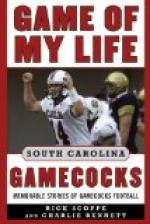THE CUSTOM OF CHRISTMAS.
Both masters and slaves regarded Christmas as a great day. When the slaveholders had made a large crop they were pleased, and gave the slaves from five to six days, which were much enjoyed by the negroes, especially by those who could dance. Christmas morning was held sacred both by master and slaves, but in the afternoon, or in a part of the next day the slaves were required to devote themselves to the pleasure of their masters. Some of the masters would buy presents for the slaves, such as hats and tobacco for the men, handkerchiefs and little things for the women; these things were given after they had been pleased with them; after either dancing or something for their amusement.
When the slaves came up to their masters and mistresses, the latter would welcome them, the men would take off their hats and bow and the women would make a low courtesy. There would be two or three large pails filled with sweetened water, with a gallon or two of whiskey in each; this was dealt out to them until they were partly drunk; while this was going on, those who could talk very well would give tokens of well wishing to their master and mistress, and some who were born in Africa, would sing some of their songs, or tell different stories of the customs in Africa. After this they would spend half a day in dancing in some large cotton house or on a scaffold, the master providing fiddlers who came from other plantations if there were none on the place, and who received from fifteen to twenty dollars on these occasions.
A great many of the strict members of the church who did not dance would be forced to do it to please their masters; the favorite tunes were “The Fisher’s Hornpipe,” “The Devil’s Dream,” and “Black-eyed Susan.” No one can describe the intense emotion in the negro’s soul on those occasions when they were trying to please their masters and mistresses.




